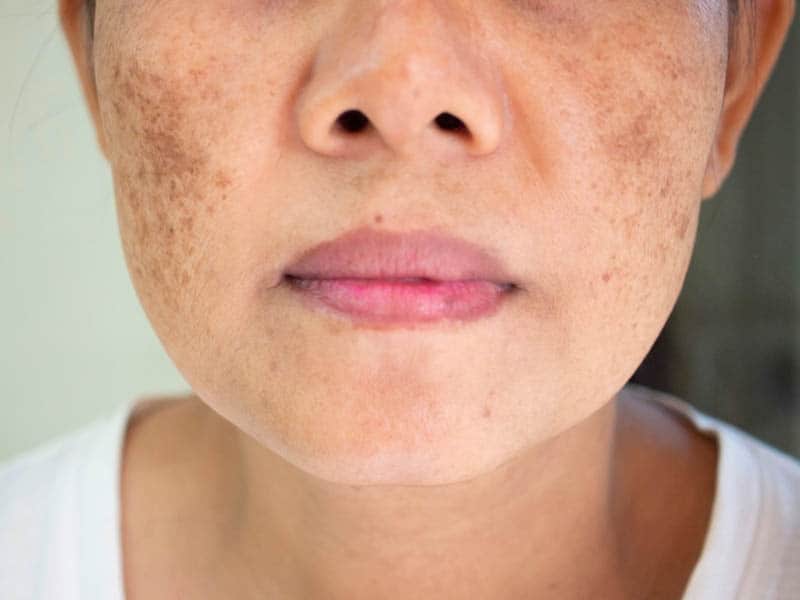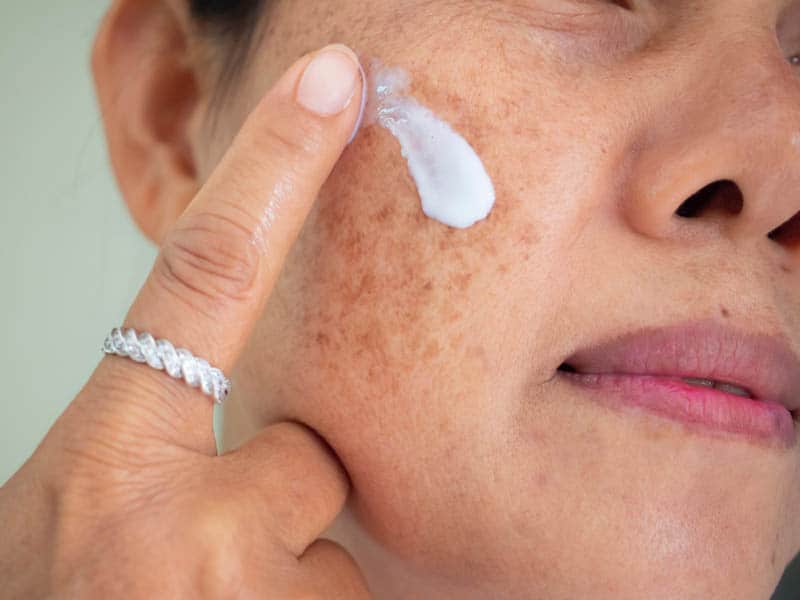Pregnancy mask, also known as melasma or chloasma, is a skin condition that causes blotchy brown spots on the face, and is common in pregnant women at around the second and third trimester.
The dark spots appear primarily on the upper lip, cheeks, forehead, and nose. It’s known that women with darker skin have a higher chance of experiencing the mask of pregnancy than ones with a lighter skin type.
Now, you’re probably wondering whether this is normal and safe. Let me assure you that you have nothing to worry about.
According to the American Academy of Dermatology, the vast majority of people who deal with melasma are women. There are only around 10% of men who have struggled with this condition.
You’ve probably noticed the dark line over your abdomen (linea nigra) as well. This is caused by increased production of melanin, which is precisely what causes melasma too.
Here’s some good news: The discoloration isn’t permanent. There’s no need to splurge on copious amounts of skincare products in an attempt to even your skin tone.
Once you have your baby and you’re no longer the “victim” of hormonal changes, the melasma should start fading away.
Below, I reveal more important facts about the pregnancy mask, its causes, and first-hand tips on how to keep it in check.
What Causes Pregnancy Mask (Melasma)?

The mask of pregnancy typically occurs due to an overflow in estrogen and progesterone levels, which lead to excess melanin production.
In turn, the moles on your skin, stretch marks, and even freckles will darken, and as I’ve mentioned above, you may also notice a dark line (linea nigra) around the middle of your abdomen.
African and Asian women have more pigment in their skin, which is why they’re more likely to experience melasma.
This is why you’re encouraged to wear a broad-spectrum sunscreen and SPF protection at all times, as sun exposure and UV rays play a large role too, and can only make it worse.
Additionally, if melasma runs in your family, you’re that much more likely to develop it as well.
Will Melasma Disappear After I Have My Baby?

In most cases, the pregnancy mask disappears naturally over time once you’ve had your baby.
Your skin tone should go back to normal within one year after having given birth to your little munchkin. It should be noted though, that in some cases, it’s known to never fully fade away.
If you use contraceptives that contain estrogen (the vaginal ring, the pill, or even the patch), you should know that this might also contribute to your skin condition.
The good news is that if you find melasma truly bothersome, you could simply consider another birth control option and see what happens.
If it’s been months and your dark spots are still not going anywhere, call your dermatologist or healthcare provider and find out about the safest treatment options.
My gyno encouraged me to try out a few options. One was this bleaching cream that is full of hydroquinone.
Another is any medication that contains tretinoin, and if none of that works, try a chemical peel.
To play it on the safe side, if you’re currently breastfeeding or planning another pregnancy, always contact your healthcare provider before resorting to any over-the-counter remedies.
One thing I was warned about and feel the urge to share with all you expectant moms is to never hope for instant results.
Sometimes, it takes many months before you start seeing progress. Patience is your best friend here. If none of the treatments I’ve suggested here help you, there’s another route to explore.
This shouldn’t be the first option, but if you’re adamant to get rid of melasma, laser treatments might do the trick.
Your dermatologist has probably done plenty of chemically-based lightening treatments and can undo the hyperpigmentation that the melanocyte-stimulating hormones have caused.
But only resort to this after having tried all the other options first.
Can The Dark Spots On My Skin Become Dangerous?

While this is unlikely, and you shouldn’t instantly assume the worst, there’s a chance that some types of discoloration could signal skin cancer or another medical issue.
If along with your hyperpigmentation, you’ve been experiencing pain, bleeding, sudden redness, or tenderness, and you’ve noticed changes around a mole, call your healthcare provider ASAP.
You’re most probably going to be referred to an experienced dermatologist who will provide you with an exact diagnosis and offer appropriate treatment options.
What Can I Do To Minimize The Dark Spots?
While melasma usually disappears over time after delivery, there are certain things you can do to minimize the blotchy spots on your skin and keep it healthy.
1. Always use protection against UV rays

Namely, an SPF factor with UVA and UVB protection to keep you safe from harmful ultraviolet rays that comes with sun exposure.
This is a crucial step, as being exposed to UV radiation can worsen the pigment abnormalities.
Most people don’t put on sunscreen if it’s not sunny, but that’s a mistake. Wear it every single day, regardless of how sunny or cloudy it is.
Moreover, putting it on before leaving the house isn’t enough.
You need to reapply it whenever you feel it’s necessary, for as long as you’re outside, even if you are dark-skinned.
You’re probably aware that darker skin doesn’t sunburn as quickly as light skin does, due to having more melanin. But that is still not protection enough.
If putting on sunscreen isn’t a habit, you can make it part of your morning ritual, even if you’re not necessarily planning on stepping outside.
The American Academy of Dermatology warns that your skin is under exposure to UV radiation every time you’re in your car, take a walk around the block, or even lounge near your window.
This is why it’s important to take all the precautions if you want to keep your melasma to a minimum.
Also, wear hats, long-sleeved shirts, and stay out of the sun from 10 a.m. until 2 p.m. when UV rays are at their strongest.
2. Ensure a high intake of folic acid

More precisely, eat foods that are filled with folic acid. It has been noted that folate deficiency is related to hyperpigmentation.
It’s of vital importance to keep great nutritional habits and to create a healthy diet that includes whole grain bread, oranges, greens, and whole-grain cereal, as this will ensure you’re never at risk of folate deficiency.
Pregnancy is never a good time to develop unhealthy eating habits, and particularly so if you’re concerned about your pregnancy mask and how it’s affecting you.
3. Don’t wax

Wax is known to cause redness to your skin and, worse off, inflammation, which can have a negative effect on melasma.
This is especially the case for all parts of your body where the pigment changes are most evident.
4. Use hypoallergenic skincare products

This is the time to be extra careful as to which products you put on your skin. Should you choose to use a concealer to match your skin tone, be certain of its quality ingredients.
Any face creams that irritate your skin should be thrown out, as they will intensify your melasma and make you feel worse about your appearance.
Ask around for a type of concealer that is suitable for hyperpigmentation and won’t be a mere waste of money.
Don’t even consider using skin-bleaching products while expecting, and ask your healthcare provider or dermatologist about any future use.
While it’s okay to turn to chemical treatments post-pregnancy, it’s risky while pregnant.
Therefore, skin lightening, bleaching, and peels are strictly off-limits until after the delivery.
Wrapping It Up
Having experienced pregnancy mask myself, I can fully sympathize with how much this can affect your view of yourself.
Melasma can make a pregnant woman feel self-conscious about her appearance and knock her emotional well-being.
While melasma cannot be prevented, it can be kept under control.
Make sure to stick to a healthy diet filled with folic acid and whole grains, use sunscreen whenever you’re outside, and get rid of any skincare products that irritate your skin.
If your melasma doesn’t go away after you’ve had your baby, consult your dermatologist about the best treatment options.
Also, always remember that this too shall pass. Sometimes, it’ll fade away naturally, and sometimes you’re going to have to take action to speed up the process.
Pregnancy is a time filled with surprises and the best way to keep a sane head is by accepting what you cannot change and dealing with things as they come.
Trust me, once you’ve given birth, you’ll forget all about the changes in your skin tone, as you’ll be too busy taking care of your new bundle of joy!
References:
• American Academy of Dermatology. (2019). “Melasma: Diagnosis and treatment” [Blog post]. Retrieved from the American Academy of Dermatology website.
• American Academy of Dermatology. (2019). “Melasma: Causes” [Blog post]. Retrieved from the American Academy of Dermatology website.
Like this post? Please share or pin it for later. You can also stay in the loop and follow us on Facebook, Instagram or Pinterest.

This post contains affiliate links. Please see our full disclosure for more info.

